What Diane Francis and friends don’t get – North America works best as Canada, Mexico, and the United States
Oct 13th, 2013 | By L. Frank Bunting | Category: In BriefI first heard of Diane Francis’s new book, Merger of the Century: Why Canada and America Should Become One Country, from a critical friend who is receiving the National Post as a promotional freebie.
I don’t usually follow this paper. I wondered why I hadn’t heard about Merger of the Century somewhere else. But when I googled the title a week or so ago, the most-visited references did seem to come from the National Post – with which Ms Francis has had a long association.
(Oh, and in case you’ve forgotten, this still quite right-wing publication was founded a mere 15 years ago, by the former Canadian by birth, appointed UK peer of the realm, and convicted US felon, Conrad Black.)
As I write now, a week or so later, there is a somewhat broader digital reaction. I should make clear as well that I have not actually read Ms Francis’s book, and I doubt that I ever will. My main sources here have been 15 short pieces about the book on the world wide web. (I have listed these 15 pieces at the end of my own hasty and transient remarks. Click on “Read the rest of this page” and/or scroll below, if you really must see the list.)
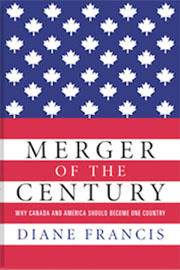 In the world of face-to-face encounters among real people, I have also tried to gently raise Merger of the Century at a few recent vaguely intellectual drinking engagements, in Canada’s current largest metropolis. Yet at least the people I go drinking with do not seem all that interested in talking about either the book and/or the larger subject it raises.
In the world of face-to-face encounters among real people, I have also tried to gently raise Merger of the Century at a few recent vaguely intellectual drinking engagements, in Canada’s current largest metropolis. Yet at least the people I go drinking with do not seem all that interested in talking about either the book and/or the larger subject it raises.
It is similarly noted at such events that Diane Francis is a dual Canadian-American citizen, who was born and raised in the United States – as well as a business journalist of real talent. And the headlines for some recent pieces on the net reflect much of the further face-to-face reaction : “Diane Francis’ plan to merge Canada and the United States has many, many problems” ; “Writer’s idea that Canada and US should merge likely DOA” ; “Diane Francis’ US-Canada merger idea draws negative reaction” ; and “Can-America: the newest, biggest country in the world … the response to Francis’s proposal has been unmistakable — ‘something between knee-jerk reactionism and hand-waving dismissiveness’.”
An idea whose time always comes … and goes
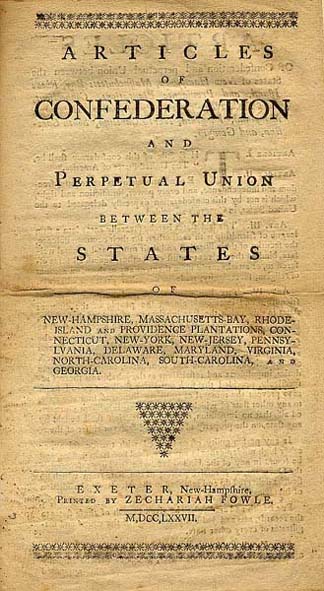
The Articles of Confederation, 1781 – the first US constitution, replaced by the present one in 1789.
What Ms Francis calls the merger of Canada and the United States is of course an ancient proposal. In one respect it goes at least as far back as Article XI of the first US constitution (known as the Articles of Confederation) that took effect on March 1, 1781 : “Canada acceding to this confederation, and adjoining in the measures of the united States, shall be admitted into, and entitled to all the advantages of this union; but no other colony shall be admitted into the same, unless such admission be agreed to by nine States.”
There have been several subsequent waves of enthusiasm for what earlier generations called the “annexation” of Canada to the United States, in both Canada and the United States. You might argue that if such a thing were ever going to happen, it would have happened by now. And as best I can tell without having read her book, Diane Francis (while she does vaguely allude to Article XI of the Articles of Confederation, in an excerpt from her book published in the National Post) does not take any long-term historical perspective into serious account.
At the same time, you might also argue that, given the particular long history of Canada and the United States, Article XI in the 1781 Articles of Confederation will always be on the table, so to speak – in the minds of some Americans, and some Canadians too. Thinking back on various tumultuous events of the past decade or so, say, around the global village and especially in the United States itself, it is not all that difficult to see how the times are ripe for yet another historic wave of interest in the annexation of Canada to the United States.
Back in the late summer of 2011, to take just one case in point, predating Diane Francis by some two years, the New York writer and consultant John Ellis posted a provocative piece on the Business Insider website, called “The Mega-Merger: The United States and Canada.” Ellis wrote : “What is needed now is something really big–a great notion that allows Americans a whole new view of their future. The idea that just might change everything is a merger between the United States of America and Canada. If President Obama proposed such a union, it could alter the trajectory of history and ignite an explosion of economic activity.”
“The United States of North America” – A Marxist concept !
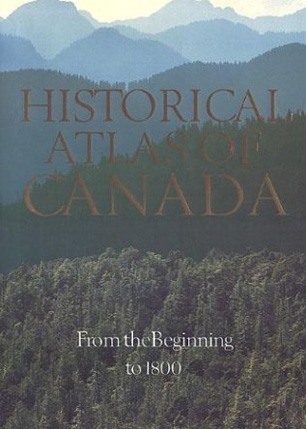 President Obama has of course not proposed such a union. And that is partly because he has better instincts about “the trajectory of history” than either John Ellis or Diane Francis. From time to time, at moments of crisis in either one or the other or both Canada and the United States, the annexation of the former by the latter has suddenly seemed like a universal nostrum for all ailments of North American society. But then the other side of the coin sets in.
President Obama has of course not proposed such a union. And that is partly because he has better instincts about “the trajectory of history” than either John Ellis or Diane Francis. From time to time, at moments of crisis in either one or the other or both Canada and the United States, the annexation of the former by the latter has suddenly seemed like a universal nostrum for all ailments of North American society. But then the other side of the coin sets in.
On this other side the “pattern of Canada,” as the 1987 path-breaking first volume of The Historical Atlas of Canada declared, “has been taking shape for almost 500 years.” Throughout this period there have been various plans, schemes, and even military conflicts to unite what are now Canada and the United States politically. But it does remain a stubborn fact of history that so far not one of them has succeeded (with the partial, turbulent, and ultimately failed exception of British North America, 1763-1783). And it also seems arguable that the longer this goes on, the stronger the barriers to any such alteration in the trajectory of history will grow.
Even those who claim to have unlocked a universal theoretical-practical secret to altering all trajectories of history have fallen by the wayside in the face of these barriers. On a CBC Radio interview several days ago, it was noted that Diane Francis was explaining “Why Canada and the US should merge to form a super-nation.” And the visiting author was asked, “So what should we call this super-nation?” Ms Francis replied : “I would call it the United States of North America.” In his summer 2011 article John Ellis similarly asked “What would a United States of North America … accomplish?” (And he went on to offer some glowing answers!)
Meanwhile, back in my small corner of present-day Canada’s largest metropolitan region, I remember that I first heard the phrase “United States of North America” back in the early 1970s. I was asking certain friends I hadn’t seen for a while, who had suddenly become devoted Marxist acolytes on some Ontario campus with a river running through it, what they thought about Canada and its future. Canada’s future, in the wake of some ultimate Marxist-inspired revolution, they told me, was to join with our southern neighbours in a new United States of North America.
You can’t really leave Mexico out of the equation …
It at least used to be often enough said that aggressive Marxists and aggressive Capitalists have much in common, believe it or not. They both claim that an ultimately crude economic determinism guides everything else in society – or at least ought to. Yet the late 20th and early 21st centuries are supposed to have shown us just how misguided this kind of concept can be.
 Vast geographic territories like the United States and Canada are full of many economic and other human subtleties, that we ignore at our peril. As just one of many cases in point, both John Ellis and Diane Francis are from the northern United States, close enough to the Canadian border – in New York and Illinois. If their American experience were focused on California or Texas or Florida (much more demographically vigorous nowadays), they would almost certainly have less passion for the economic consequences of a Canada-US merger, as the key to a new “United States of North America.”
Vast geographic territories like the United States and Canada are full of many economic and other human subtleties, that we ignore at our peril. As just one of many cases in point, both John Ellis and Diane Francis are from the northern United States, close enough to the Canadian border – in New York and Illinois. If their American experience were focused on California or Texas or Florida (much more demographically vigorous nowadays), they would almost certainly have less passion for the economic consequences of a Canada-US merger, as the key to a new “United States of North America.”
Similarly, like other Canadians today (and for many years in the past too), I have family – and in-laws – currently residing in the United States. But they are in the most populous state of California, not New York or Illinois. And when I visit California I can see without being told that “It’s Official: Latino Population Now Equals That of Whites in California.” (Or : “Hispanics Will Be The Largest Group In California By 2014 …Â Hispanics were the majority in California when it was part of Mexico more than 165 years ago, and will again be the state’s largest ethnic group by early next year, the Golden State’s Department of Finance says.”)
Nationally in the United States today, Mexicans account for almost two-thirds of the Hispanic or Latino population. And at least some Americans who live in California, or Florida, or Texas (just to start with) might be forgiven for thinking that if the United States is going to merge with one or the other of its current North American Free Trade Agreement (NAFTA) partners, it ought to be Mexico, not Canada.
 From this angle what John Ellis and Diane Francis and others with similar ideas are talking about isn’t some fresh proposition about reviving North American economic dynamism in a new era of change and challenge in the global village. We have in fact been working on symbiotic North American economic integration for the past quarter century now – starting with the Canada-US Trade Agreement in the late 1980s, and then quickly culminating with the North American Free Trade Agreement (NAFTA) among Canada, Mexico, and the United States in the mid 1990s.
From this angle what John Ellis and Diane Francis and others with similar ideas are talking about isn’t some fresh proposition about reviving North American economic dynamism in a new era of change and challenge in the global village. We have in fact been working on symbiotic North American economic integration for the past quarter century now – starting with the Canada-US Trade Agreement in the late 1980s, and then quickly culminating with the North American Free Trade Agreement (NAFTA) among Canada, Mexico, and the United States in the mid 1990s.
It may or may not be that the NAFTA framework needs some updating in 2013. Yet the crucial point remains: Virtually all the real economic advantages of “merging” Canada and the United States, on the Ellis-Francis model, can be achieved more realistically and effectively through the NAFTA framework – without foolishly trying to destroy the many economic and other human subtleties and diversities that make life in all three countries interesting.
In fact, John Ellis and Diane Francis are really talking about some new wave of what the Harvard historian Maya Jasanoff has called “American continental imperialism,” in her recent review of Walter Johnson’s River of Dark Dreams : Slavery and Empire in the Cotton Kingdom.
Ms Jasanoff argues that there are important connections between this historic “American continental imperialism” and “American imperialism overseas.” And she quietly implies (rightly so, I think) that both American imperialisms have now passed their best-before dates – from the standpoint of both democracy in America and human freedom on the rest of planet.
As if to show just how much plain common sense it does make, Maya Jasanoff’s argument has recently been brought to life in a less intellectual way by a letter to the Windsor Star, from a Canadian now resident in California (but not, I hasten to add, any Canadian in the Golden State I know myself): “Regarding the Diane Francis book, Merger of the Century, it speaks for the same right wing, globalist cabal that has stripped Canada of many of its industries … I have been privileged to spend part of my career working in southern California but that does not make Canada any less my home for me, nor make it any less distinct from America …  I have great respect for Americans but we need to understand that their political genetics are very different from ours.” (DAN PERLEY, Costa Mesa, California).
But Diane Francis is right about one thing … and Canadians who want to keep Canada in business ought to start doing something about it!
I don’t want to end my own hasty and transient remarks about Ms Francis’s new book on the kind of mindlessly negative note that does seem to have characterized much of the reaction so far in Canada. I do think she is a business journalist of real talent. She has worked and lived in Canada for many years now, and she does understand some things about the place.
Put simply, we in Canada today are indeed living in a new era of change and challenge in the global village. It has implications for what we have been able to get away with in the past. We are going to have to change our ways in many respects, if we are serious about surviving as what we ourselves at least regard as an independent country.
At this stage of my life – in an increasingly senior citizen mode – I also feel strangely called upon to express my fears for the Canadian future. J.J. McCullough, the “Huff Post Canada Media Critic,” has noted, in commenting on Ms Francis’s new book, that : “In any case, to even begin contemplating an economic, geographic, constitutional, cultural, and legal initiative this enormous, it’d probably help to have a rate of public support higher than 19 per cent.”
Mr. McCullough was quoting here from a 2001 Leger Marketing study, which found that 19.9% of Canadains, actross the country, answered Yes or For to the question “Would you be FOR or AGAINST the idea of annexing Canada to the United States?” Yet a few days after he wrote, in early October 2013, Huffington Post Canada, in a no doubt not quite scientific poll, found that 24.59% of respondents were answering Yes to the question “Should Canada and the US merge?” Some 67.29 % (happily enough) answered “No.” And a somewhat distressing 8.13% opted for “It’s inevitable, so why fight it?”
 There are many things that could be done about all this. With some two-thirds of Canadians still on the side of the angels (if the latest Huffington Post poll has some claims to accuracy), it is not yet time for we staunch Canadian patriots to start slitting our wrists. But it does seem to me that there is much hard work ahead for those who feel as I do about these matters.
There are many things that could be done about all this. With some two-thirds of Canadians still on the side of the angels (if the latest Huffington Post poll has some claims to accuracy), it is not yet time for we staunch Canadian patriots to start slitting our wrists. But it does seem to me that there is much hard work ahead for those who feel as I do about these matters.
In Canada as well I don’t think that economics is the only or even the most crucial issue. As just one weird other kind of example, Stephen Harper’s recent attempts to revive the British monarchy in Canada seem to me altogether misguided – and in a strangely significant way for what Diane Francis is talking about.
 There no doubt was a time in the 19th century, when the British monarchy (or more exactly the military might of the British empire) saved Canada from Maya Jasanoff’s American continental imperialism. But times have changed. What the legal scholar Brian Slattery has called “the long process of decolonization that Canada has undergone since 1867” has come to an end at last.
There no doubt was a time in the 19th century, when the British monarchy (or more exactly the military might of the British empire) saved Canada from Maya Jasanoff’s American continental imperialism. But times have changed. What the legal scholar Brian Slattery has called “the long process of decolonization that Canada has undergone since 1867” has come to an end at last.
In today’s decolonized and “de-imperialized” Canada, two things ought to be obvious, I think. The first is that the kind of merger of Canada and the United States envisioned by Article XI of the 1781 Articles of Confederation is no longer possible. The second is that the British monarchy in Canada today is palpably dysfunctional for any serious conception of Canadian unity, that all parts of the country can embrace in the 21st century.
 It is a troubling sign of our continuing political immaturity, I think, that (albeit declining numbers of) many otherwise intelligent and sensible people still think the British monarchy in Canada still makes some kind of sense. (And no wonder Diane Francis thinks there is some parallel market for the equally obsolete concept of a merger of Canada and the United States!)
It is a troubling sign of our continuing political immaturity, I think, that (albeit declining numbers of) many otherwise intelligent and sensible people still think the British monarchy in Canada still makes some kind of sense. (And no wonder Diane Francis thinks there is some parallel market for the equally obsolete concept of a merger of Canada and the United States!)
So … on some similar Montreal Plateau (and/or Vancouver mountain or Halifax tide or Iqaluit igloo), next weekend I will be attending the Toronto inaugural meeting of Republic Now/République du Canada – a new “grass-roots organization whose primary mission is to advocate for the replacement of the non-resident British monarch as our Head of State with a democratically-selected resident Canadian.”
 The meeting will take place on SATURDAY, OCTOBER 19, 2013, from 2PM to 5PM. The keynote speaker will be Duff Conacher, Founding Director of Democracy Watch. He will speak on “Reimagining Canada’s Constitution: How Could We Resolve Outstanding Issues Together?” The meeting will also include get-acquainted discussion groups – to give all who attend a chance to air their own views on Canada’s independent democratic future. It will take place in the Rotunda at Metro Hall, 55 John Street (south-east corner of King and John, two blocks east of Spadina). All are welcome. (And admission is free.)
The meeting will take place on SATURDAY, OCTOBER 19, 2013, from 2PM to 5PM. The keynote speaker will be Duff Conacher, Founding Director of Democracy Watch. He will speak on “Reimagining Canada’s Constitution: How Could We Resolve Outstanding Issues Together?” The meeting will also include get-acquainted discussion groups – to give all who attend a chance to air their own views on Canada’s independent democratic future. It will take place in the Rotunda at Metro Hall, 55 John Street (south-east corner of King and John, two blocks east of Spadina). All are welcome. (And admission is free.)
Of course, many other things could and should be done in support of the broader cause of what our Constitution Act, 1982 calls the free and democratic society in Canada. (And for evidence that even the Harper government is not altogether immune to common sense in these matters, see the counterweights editors on “The Cooperative Capital Markets Regulator in Canada .. three surprised cheers for Flaherty, Sousa, and de Jong.”) But politely retiring the British monarch as Canada’s symbolic head of state (in favour of a proper representative of the sovereign Canadian people – and yes of course at the end of the reign of the present good Queen Elizabeth II) would at least be a sensible and practical START!
APPENDIX : 15 SHORT ARTICLES ON DIANE FRANCIS’S NEW BOOK
SEP 28 – Jonathan Kay: Diane Francis’ plan to merge Canada and the United States has many, many problems
SEP 30 – Diane Francis: The merger of the century [a short excerpt from her book]
SEP 30 – Diane Francis on a Canada-US merger
SEP 30 – Writer’s idea that Canada and US should merge likely DOA
SEP 30 – Media Bites: Could Canada and America Ever Merge? …Â J.J. McCullough
SEP 30 – First Look: Merger of the Century, The New Book By Diane Francis
SEP 30 –Â Letters : Canada should return to middle power status and protect the people
OCT 1 – North American Union? Diane Francis Pushes US-Canada Merger
OCT 5 – A Canadian Journalist Dreams Of The Day When Her Country Finally Merges With The United States
OCT 7 – Why Canada and the US should merge to form a super-nation
OCT 8 – Janet Tucket [Tucker] On US/Canada Merger
OCT 9 – Diane Francis’ US-Canada merger idea draws negative reaction
OCT 9 – China’s economic threat is overblown
OCT 11 – Can-America: the newest, biggest country in the world.

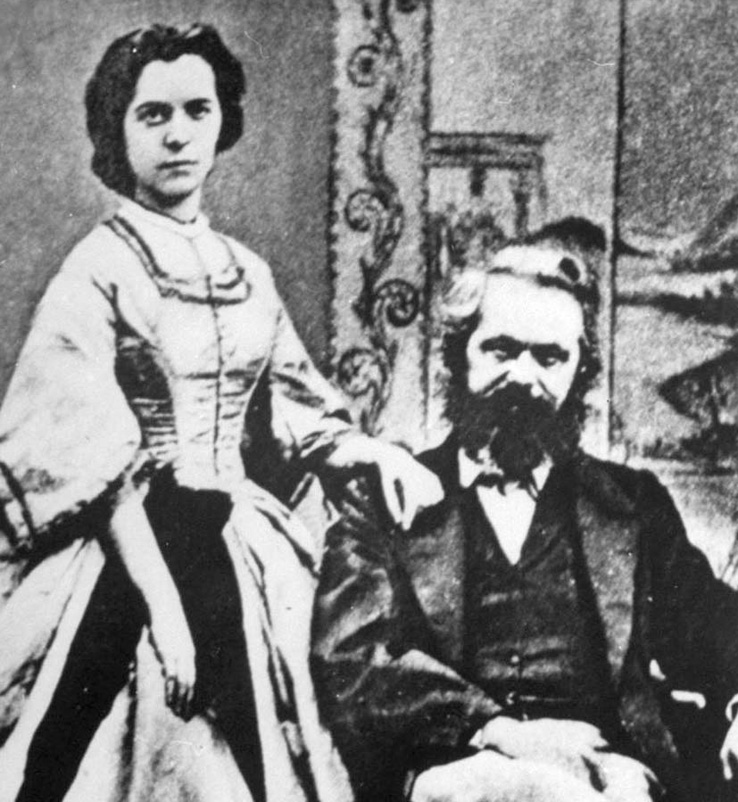

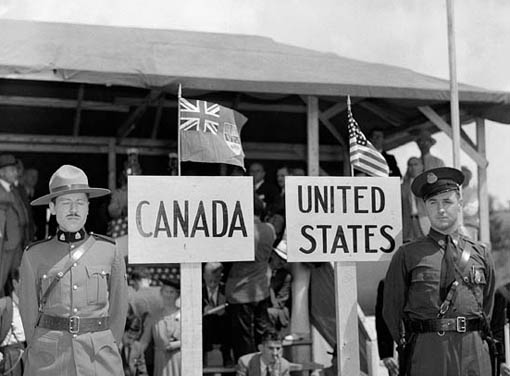



You should read the book